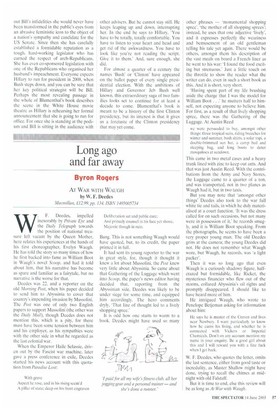Long ago and far away
Byron Rogers
AT WAR WITH WAUGH by W. F. Deedes
Macmillan, £12.99, pp. 134. ISBN 1405005734
W.F. Deedes, impelled inexorably by Private Eye and the Daily Telegraph towards the position of national treasure left vacant by the Queen Mother, here relates his experiences at the hands of his first choreographer, Evelyn Waugh. He has told the story so many times of how he first backed into fame as William Boot in Waugh's novel Scoop, and had it told about him, that his narrative has become as spare and familiar as a fairytale, but no narrative is the worse for that.
Deedes was 22, and a reporter on the old Morning Post, when his paper decided to send him to Abyssinia to cover that country's impending invasion by Mussolini. The Post was one of only two English papers to support Mussolini (the other was the Daily Mail), though Deedes does not mention this, which is a pity, for there must have been some tension between him and his employer, as his sympathies were with the other side in what he regarded as the last colonial war.
When the Emperor Haile Selassie, driven out by the Fascist war machine, later gave a press conference in exile, Decdes started his news account with this quotation from Paradise Lost:
With grave Aspect he rose, and in his rising seem'd A pillar of state; deep on his front engraven Deliberation sat and public care;
And princely counsel in his face yet shone, Majestic though in ruin.
Bang. This is not something Waugh would have quoted, hut, to its credit, the paper printed it in full.
It had sent its young reporter to the war in great style, for, though it thought it knew a lot about Mussolini. the Post knew very little about Abyssinia. So came about that Gathering of the Luggage which went into Scoop, the paper's news editor having decided that, reporting from the Abyssinian side, Deedes was likely to be under siege for some time, and equipped him accordingly. The hero comments dryly, That line of thought led to a lively shopping spree.'
It is odd how one starts to warm to a book. Deedes might have used so many
other phrases — 'monumental shopping spree'. 'the mother of all shopping sprees'; instead, he uses that one adjective 'lively', and it expresses perfectly the weariness and bemusement of an old gentleman telling his tale yet again. There would be others, amongst them his description of the vast meals on board a French liner as he went to his war: 'I found the food exciting but strenuous.' Just a little touch on the throttle to show the reader what the writer can do, even in such a short book as this. And it is short, very short.
'Having spent part of my life brushing aside the charge that I was the model for William Boot . .' he mutters half to himself, not expecting anyone to believe him. For first, as a result of that lively shopping spree, there was the Gathering of the Luggage. At Austin Reed
we were persuaded to buy, amongst other things: three tropical suits, riding breeches for winter and summer, bush shirts, a solar topi. a double-brimmed sun hat, a camp bed and sleeping bag, and long boots to deter mosquitoes at sundown.
This came in two metal cases and a heavy trunk lined with zinc to keep out ants. And that was just Austin Reed. With the contributions from the Army and Navy Stores, the Luggage came to a quarter of a ton, and was transported, not in two planes as Waugh had it, but in two taxis.
But you may note that 'amongst other things' Deedes also took to the war full white tie and tails, in which he duly materialised at a court function. 'It was the dress called for on such occasions, but not many were in possession of it,' he records smugly, and it is William Boot speaking. From the photographs, he seems to have been a very proper young man. The old Deedes grins at the camera; the young Deedes did not, He does not remember what Waugh wore, but Waugh, he records, was 'a light packer'.
Then it was so long ago that even Waugh is a curiously shadowy figure, halfcrazed but formidable, like Ricket, the mysterious financier who flew out of the storms, collared Abyssinia's oil rights and promptly disappeared. I should like to have heard more of him, He intrigued Waugh, who wrote to Penelope Betjeman asking for information about him:
He says he is master of the Craven and lives near Newbury. I want particularly to know how he earns his living, and whether he is connected with Vickers or Imperial Chemicals. Don't on any account mention my name in your enquiry. Be a good girl about this and I will reward you with a fine fuck when I get back.
W. F. Deedes, who quotes the letter, omits the last sentence, either from good taste or incredulity, as Master Shallow might have done, trying to recall the chimes at midnight with old Falstaff.
But it is time to end, else this review will be as long as At War with Waugh.


































































































 Previous page
Previous page